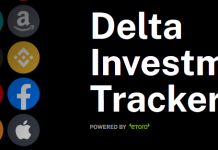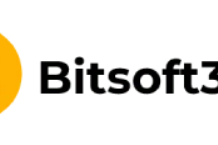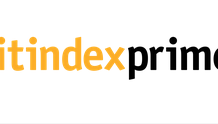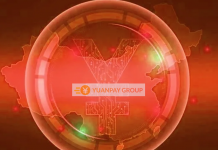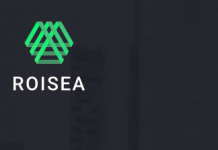 The huge increase in interest in the cryptocurrency market among individual investors has made companies outdo each other in offering ever better, simpler and cheaper solutions enabling trade and exchange of virtual currencies. This fact has caused that has just appeared a company on the Polish market, thanks to which even people who do not have huge skills and knowledge about investing can safely, quickly and easily acquire their first coins. We are talking about Luno, which has been on the market since 2013. Taking this opportunity, we managed to talk with Marcus Swanepoel, one of the co-founders and ask him a few questions.
The huge increase in interest in the cryptocurrency market among individual investors has made companies outdo each other in offering ever better, simpler and cheaper solutions enabling trade and exchange of virtual currencies. This fact has caused that has just appeared a company on the Polish market, thanks to which even people who do not have huge skills and knowledge about investing can safely, quickly and easily acquire their first coins. We are talking about Luno, which has been on the market since 2013. Taking this opportunity, we managed to talk with Marcus Swanepoel, one of the co-founders and ask him a few questions.
As we were able to find out, Marcus is a passionate programmer and technology enthusiast. He has always been fascinated by the positive changes that technology can bring to the world. He has worked in finance related positions in emerging markets for the last 10 years. At Luno, he combined this experience with a passion for finance and technology to become part of a new generation of financial services.
Q: You have been pioneers in the industry and have been operating since 2013. At the beginning of 2017, Luno functioned as BitX. What prompted you to rebrand and establish Luno?
 A: We realised that more and more people are buying digital currencies and many of them were just normal people, not just professional traders. Most Bitcoin companies have rather technical names and BitX was no different. We wanted our brand to be friendly and accessible for everyone, not just a “techie” few. We wanted a name that has positive connotations, as well as showcasing the potential of the industry and its ‘friendly’ ecosystem.The most fitting name for us was Luno. The reference to the moon is not accidental. Luno in esperanto literally means moon, and variations of this word can be found in many languages like Spanish (luna), Italian (luna), Russian (луна́ (luná)) or French (lune). It shows our commitment in helping take people to a new and exciting place (the ‘moon’) in a safe and convenient manner (we are the crew and space ship). ‘The moon’ also reflects some some idiosyncrasies of the Bitcoin industry as well as what we’re planning to do in the future, so it is a brand that reflects our past, present and future – you can read more about the Lun brand story here: https://www.luno.com/blog/en/post/to-the-moon
A: We realised that more and more people are buying digital currencies and many of them were just normal people, not just professional traders. Most Bitcoin companies have rather technical names and BitX was no different. We wanted our brand to be friendly and accessible for everyone, not just a “techie” few. We wanted a name that has positive connotations, as well as showcasing the potential of the industry and its ‘friendly’ ecosystem.The most fitting name for us was Luno. The reference to the moon is not accidental. Luno in esperanto literally means moon, and variations of this word can be found in many languages like Spanish (luna), Italian (luna), Russian (луна́ (luná)) or French (lune). It shows our commitment in helping take people to a new and exciting place (the ‘moon’) in a safe and convenient manner (we are the crew and space ship). ‘The moon’ also reflects some some idiosyncrasies of the Bitcoin industry as well as what we’re planning to do in the future, so it is a brand that reflects our past, present and future – you can read more about the Lun brand story here: https://www.luno.com/blog/en/post/to-the-moon
Q: Luno currently operates in 40 countries. In which of these is the interest in cryptocurrencies the greatest? Why do you think this is?
A: Yes, Luno operates on 3 continents – Europe, Asia and Africa – and in 40 countries across these regions. We recently moved our headquarters from Singapore to London as we expanded into Europe. We also have offices in Indonesia, Malaysia and Cape Town, where a lot of the team is based. The decision to open offices globally stemmed from our understanding of the differences between each region. We want to provide a product tailored to each individual market, and localisation was key. From our collective experience working in financial services and large tech companies, we understand the need to be very close to our customers, so having physical people on the ground and locals from the countries we operate in are very important. That is why we are hiring locally, employees who know their markets better than anyone, and can help us build Luno’s presence globally. Generally we are seeing similar growth patterns across the board – this is because cryptocurrencies are such a universal concept with a universal appeal and the use cases are quite similar (right now) across all the markets we are in. Some of the markets do develop later than others though, for example the penetration in Africa is less than Europe right now because people tend to have less disposable income, but as the use case of cryptocurrency starts transforming more from investment to transactional, we expecting the emerging markets to overtake developed markets.
Q: Do you plan further expansion? If so, which markets?
A: Of course. That is the beauty of the industry – there are no borders! We will be entering new markets one step at a time as it is vital that we meet the individual regulations applicable in each market and deliver the right product for the local customer base. That said, we have already set up our infrastructure to launch in a number of countries with over a billion people (collectively) when the time is right, so watch this space!
Q: For what client are you targeting your offer? (a professional trader or a beginner cryptocurrency enthusiast)
A: In Europe we are targeting mainly cryptocurrency enthusiasts, who could be anyone from trying it out for the first time, to people that use it for transactions or think of it as a long term asset to hold.
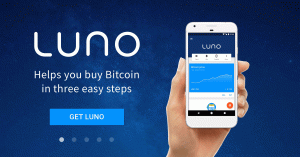 As mentioned before, it has become clear that more and more people are buying digital currencies, even though, they are not professional traders. That is why we have built a friendly interface, made buying/selling simple enough for anyone to be able to buy Bitcoin and Ethereum in a matter of seconds with just a couple of clicks.
As mentioned before, it has become clear that more and more people are buying digital currencies, even though, they are not professional traders. That is why we have built a friendly interface, made buying/selling simple enough for anyone to be able to buy Bitcoin and Ethereum in a matter of seconds with just a couple of clicks.
We also operate a number of exchanges (platform for traders) as well as an open enterprise/API platform that other businesses use to integrate with, but our immediate focus in the EU is our wallet solution (which actually suits the needs of both the trader and the casual enthusiast in most cases).
Q: Luno makes it easy to quickly buy and store digital currencies such as Bitcoin and Ethereum. Do you plan to expand the offer on other coins?
 A: Not for the time being. We decided to focus on those two currencies and perfect the offering. Maybe in the future we will look at additions, but we are also careful to add too many as there are many crypto currencies that are either scams or going nowhere, and it’s important that we give our customers the right products and services and protect them from this. Everything depends on our customers, we look at demand and assess whether it makes sense and ultimately do what we can to make them happy! You can read more about how we think about adding new currencies here:
A: Not for the time being. We decided to focus on those two currencies and perfect the offering. Maybe in the future we will look at additions, but we are also careful to add too many as there are many crypto currencies that are either scams or going nowhere, and it’s important that we give our customers the right products and services and protect them from this. Everything depends on our customers, we look at demand and assess whether it makes sense and ultimately do what we can to make them happy! You can read more about how we think about adding new currencies here:
https://www.luno.com/blog/en/post/multi-digital-currency-world
Q: Experience has taught us that keeping funds on the cryptocurrency exchange platforms is not the safest option, because they can “vanish into thin air”. How do you ensure the security of customers funds?
A: We have over 1.6 million customers who trust us with their money – they are buying/selling and storing bitcoin and ethereum with us around the clock. They are the best validation of the quality and security of our services. We successfully operate in 40 countries and have processed billions of dollars and pride ourselves in being a market leader and one of the most respected players in the space.
We secure accounts with 2 factor authentication, as well as advanced KYC procedures for high-value customers, not to mention our “cold storage” and secured “hot wallet” products. The majority of funds are kept in what we call “deep freeze” storage; multi-signature wallets, with private keys stored in different bank vaults around the world. When we started in 2013 we actually used to build crypto systems for banks, and so while many players say they have ‘bank-grade security’ and it’s not true, we actually do have bank-grade security! For customer feedback it is well worth a look at the reviews in AppStore and GooglePlay – we would prefer our customers to vouch for us!
You can read more about our security here: https://www.luno.com/en/security
Q: Do you think that cryptocurrencies in future have the potential to replace or at least co-exist on equal rights with fiat currencies?
A: Yes, of course. It is just matter of time. In the not too distant future, we will enter the phase where both will coexist, but in the longer term I am sure that digital currencies will be an intrinsic part of everyday life. I wrote about it some time ago in a post called ‘Looking in the rearview mirror’ which explains why adoption is far closer than many people think. The possibilities are endless, or as we say: to the moon (luno).
You can read more about how we see the market progress here: https://medium.com/@marcusswanepoel/looking-in-the-rearview-mirror-16d42552d94a
Q: Do you think the idea of creating cryptocurrencies issued by Central Banks does not conflict with the idea of decentralised cryptocurrencies?
A: This is an interesting concept and something we’ve been discussing with various central banks for over 4 years. I would not call it a conflict in that it couldn’t co-exist, it certainly can just like fiat and cryptocurrencies co-exist today, but it is obviously a very different mechanism (open vs closed) and in a free market you will see the value flow to the one that is most useful and valuable to people.
The main issue for the central banks are that:
- It will take them a very long time to move from pilot to legislation of this phase (10-20 years) so who knows how big crypto will be by then,
- They would still have to force an entire country (banks, merchants, businesses etc) to adopt this new system, no mean feat and
- It could actually make the entry into crypto a lot easier because of the frictionless conversion between these new currencies and crypto. So it could be that these work very well in parallel with crypto, but it could also accelerate the adoption of crypto. We are working with central banks and looking at this in a lot of detail to make sure we stay ahead of the curve, but ultimately we are all just interested in making sure there is a value transfer system (i.e. money) that is the most useful and safe for consumers, whatever the eventual form may be.
Q: What are the barriers to wider use of cryptocurrencies by consumers at the moment?
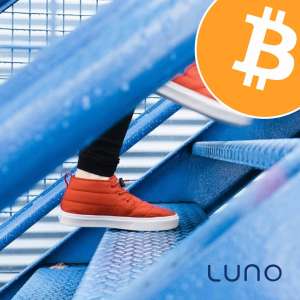 A: It depends on what you mean by “wider”. If we are talking about buying/selling crypto there are no outright barriers, but believe it or not, it is still relatively difficult to find a service provider you can trust where it is easy to buy cryptocurrency (ie get verified, transfer your money) – this is the service Luno provides. There is also somewhat of a barrier in terms of education – it is still difficult to find objective and high quality educational materials that explain things about tin industry to non-technical people – again something we are very focused on with our Learning Portal and other upcoming initiatives. When it comes to ‘using’ Bitcoin (i.e. sending/receiving, spending online), one of the recent barriers was the transaction fees on the Bitcoin blockchain that became very high because of the popularity of Bitcoin (also often referred to as the ‘bitcoin scaling debate’), but with new initiatives like Segwit and Lightning being implemented, this will eventually go away and a lot of the transactional barriers will be broken down. More generally speaking.
A: It depends on what you mean by “wider”. If we are talking about buying/selling crypto there are no outright barriers, but believe it or not, it is still relatively difficult to find a service provider you can trust where it is easy to buy cryptocurrency (ie get verified, transfer your money) – this is the service Luno provides. There is also somewhat of a barrier in terms of education – it is still difficult to find objective and high quality educational materials that explain things about tin industry to non-technical people – again something we are very focused on with our Learning Portal and other upcoming initiatives. When it comes to ‘using’ Bitcoin (i.e. sending/receiving, spending online), one of the recent barriers was the transaction fees on the Bitcoin blockchain that became very high because of the popularity of Bitcoin (also often referred to as the ‘bitcoin scaling debate’), but with new initiatives like Segwit and Lightning being implemented, this will eventually go away and a lot of the transactional barriers will be broken down. More generally speaking.
But in general, there are a lot of challenges in front of the industry:
- Regulations. Ironically the biggest problem is the lack of them. The players in the industry don’t know what they can/can’t do. Proper regulations should come into play as soon as possible, and we are working closely with various regulators to make this happen. In the meantime we self-regulate by applying very high standards of KYC and AML.
- Trust. There have been several scandals relating to stealing money from less trustworthy exchanges and consequently people are afraid to keep their money on digital currencies platforms. We need to educate the market and explain to people how to keep their money secure and that not all service providers are the same when it comes to security, and they need to understand the differences.
- Price instability. These make digital currency a high risk investment. There is the potential to become rich or broke within a matter of days / weeks. This all boils down to education again. People need to understand the risks associated with digital currencies, and to not spend more than they can afford to lose as this is still a very new technology.
Q: Are not you afraid that consumers still have too much aversion to trade in cryptocurrencies ? According to the results of one of the latest surveys conducted on the Polish market, 48% of people are against introducing cryptocurrencies as a form of payment in shops, and 75% would not accept payment in BTC for valuable goods.
A: I am aware of this data, it was prepared by Ceneo, and only 6 500 people took part, which makes it hard to say that the group represents a majority. But I do understand the concerns. People are not willing to accept payments with Bitcoin because they are afraid that in a week the value will reduce in a matter of days or weeks. That said, when we do merchant integrations (as we have on other regions, more than 10 000 merchants) we actually hedge this volatility out for the merchant on their side, so it is not something they need to worry about – they still get the same amount in local currency (but with less fees).
The same with payment, the customer currently has no idea how much he/she is paying while using Bitcoin. Today it might be £6,1K tomorrow, £12K and in a week £5k. With this level of fluctuation how do we know if we are paying fair price or overpaying/underpaying? As a humans we are rational, we want to understand the value of our purchase. And until the currency is stable, people will be too afraid to pay with it. That is why we explain in that other article that we see a mix of use case between investment and transactional, and over time as the currency stabilizes we will see this mix change – but at any given time there is a particular use case for everyone – which really is the beauty of cryptocurrency and the reason it is growing so fast all over the world.
It is worth mentioning that in the same report, almost 90% of customers know what Bitcoin is, and almost 80% knew the value of 1 bitcoin. This is really positive and puts Poland pretty high on our roadmap.
Thank you Marcus for interesting and inspiring convesrsation ! I wish you many successes and even more satisfied clients.




![Mayrsson TG Reviews: Why Choose Crypto-Trading with Them? [mayrssontg.com]](https://comparic.com/wp-content/uploads/2023/12/image1-218x150.jpg)



